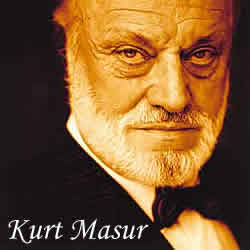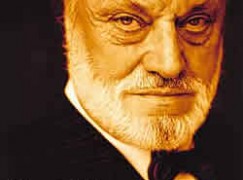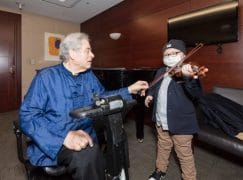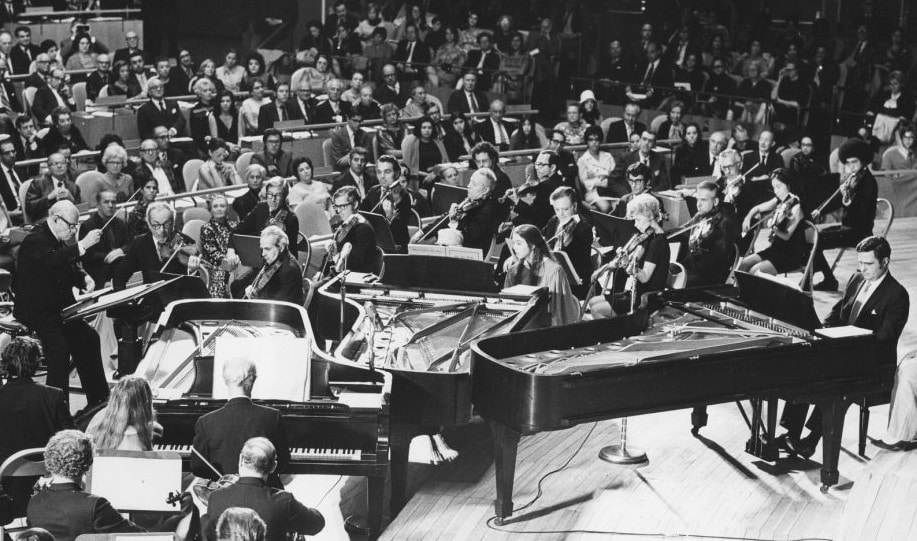How the New York Philharmonic responded to 9/11
NewsKurt Masur was one of the first conductors to address the magnitude of the terrorist atrocity with an appropriate classical work of reflection and healing.


Kurt Masur was one of the first conductors to address the magnitude of the terrorist atrocity with an appropriate classical work of reflection and healing.

We’ve been given to understand that tonight’s Lebrecht…

Pablo Casals conducts a gloriously old-fashioned 1971 performance…

From the last Lebrecht Album of the Week…

The Chinese-Australian pair of comedy fiddlers have called…

Session expired
Please log in again. The login page will open in a new tab. After logging in you can close it and return to this page.
No music better suited to the occasion than this.
And in my opinion, only “classical” music has a repertoire of pieces suited to an occasion such as this one. With all due respect to other and more popular forms of music, just about any song or piece they can offer up would seem somehow puerile and grating.
It just shows how little you know about music and displays the utter arrogance often displayed by the “classical brigade”. I will back my choice against any of yours for sheer musicality, spirituality and a voice that moved millions………..https://www.youtube.com/watch?v=byRXcyZn7YE
Ellingonia:
1) I stand by my opinion, and it is only that, an opinion. Which you are free to like or lump.
2) You are right. I admit to knowing far too little about music. I wish I knew everything about music. I’m working on it. Won’t get there. Grim reaper’s lapping me in that race. Damn.
3) I freely and happily concede the great artistry of Mahalia Jackson and her ability to move and inspire millions, and there are others with similar powers.
4). But to return to my point #1, the thing (to me) about certain pieces of classical music, and the German Requiem in particular, that other idioms either fail at or struggle with, is that it unifies in its message by retaining an element of secularity, rather than requiring the presence of faith, and a very particular faith at that, to assist. A non-believer should be able to hear and appreciate Mahalia Jackson’s touching sincerity, but (again, to me) it is her fellow believers that get the most out of what she is singing and how she sings it.
Even today the scholars wrangle over whether the German Requiem is a Christian work, and that debate goes way way back to the original conductor of the piece. If it is Christian it is so non doctrinaire that very few would feel excluded by it. That is remarkable. It is hard to think of another composer’s Requiem where this analysis or discussion could even take place.
So, a (typically) long-winded way of saying that forms of music other than classical that are intended to convey solace, hope, and sorrow, almost always do so from one explicit standpoint of faith or another. Which is fine. It isn’t lesser quality because of it. But it does mean some are or feel left out of the message, by intent or by choice or by the happenstance of how things are. Certain pieces of classical music are able to avoid this exclusion.
But any link to a Mahalia Jackson video is appreciated.
Careful not to equate simplicity with lack of profundity.
Important to never forget also the great Kurt Masur.
I would like to remember also two things. The Berlin Phil came to Carnegie Hall shortly after 9/11 with Abbado. Originally scheduled to perform Mahler they changed their programs to Beethoven Symphonies performed with reduced forces (4 basses). These performances were absolutely life enhancing for those of us who had witnessed the attacks or known people who had died. Abbado’s Beethoven will live forever in my memory. Also the Kirov Orchestra came with Gergiev a few days later. I remember as the finale of Tchiakovsky’s 5th blazed into the last few minutes that the side doors to the hall (which open onto 7th Avenue) had been intentionally opened – so that New York City could hear Tchaikovsky. A beautiful thing to do. Everyone was struggling emotionally during that time and we needed all the music we could get.
I remember the BPO change. Some of the musicians didn’t want to travel to the U.S. so soon after the attack, so they switched to Beethoven. The concert I attended was supposed to be Mahler’s 7th, but wound up being Beethoven’s 5th and 6th. While I didn’t think the 5th was anything special, I still recall that Pastoral as a truly great performance.
Ok. I got mine. I heard that BPO Brahms 1 Pollini/Beethoven 7. Never got Abbado’s message, if there ever was one….
Where I was, we had Mahler 6 ready to go, 6 rehearsals that week (every day but 9/11) for a January performance. That’s how it worked there for scheduling reasons. CH wasn’t open yet by Sunday 9/16, so no place to play. (Outdoors in Damrosch Park maybe.) So I was told, “No.”
How appropriate as Tchaikovsky conducted the first performance at Carnegie Hall.
And, don’t forget Thomas Quastoff’s amazing performance of Ich bin der Welt abhanden gekommen on opening might of the Berlin concerts.
I believe the last outdoor Philadelphia Orchestra concert I attended at the Mann Center was the special one given within days of the 9/11 attack. Sawallisch conducted. I don’t remember the program, but I believe it included Barber’s Adagio for Strings.
Let’s also acknowledge “On the Transmigration of Souls,” by John Adams, commissioned by the NY Philharmonic for the start of their 2002 season. It won the Pulitzer Prize plus three Grammys.
And on Saturday, the anniversary, it could be heard on Deutschlandfunk, one of the public radio stations in Germany. They did a whole evenin commemorating 9/11. Moving piece…
I once spoke to Maestro Masur about this concert the following summer when he appeared with the Boston Symphony at Tanglewood. He was still very moved by the performance and said that it was the only piece he could think of to play for such an occasion.
I don’t have (or want) Facebook so the link to the video/audio clip is unavailable to me.
Please don’t forget this: the New York Philharmonic commissioned a piece from John Adams about 9/11, and he responded with “On the Transmigration of Souls” which premiered at Avery Fisher Hall in September 2002 with Lorin Maazel conducting.
The 25-minute work is for full orchestra, choir, children’s choir, horn soloist, boy speaker, and numerous taped speaking voices. The texts are taken from missing persons flyers and memorials posted near the ruins of the World Trade Center, as well as from airline stewardesses’ last phone calls.
It is in no way a dour requiem or memorial piece; Adams defines “transmigration” as “the movement from one place to another”, so the title applies to those lost and those who survived.
And it won the Pulitzer Prize.
You can find it on YouTube.
Loved your work, Kurt Masur. A conductor who knew about terror and oppression while living in East Berlin.
Yes he did but rather than engaging in hatred and recriminations he strived to bring people together and worked tirelessly to pave the way for democracy to flourish in the former E. Germany.
Minor correction: “while living in Leipzig”, where he was chief conductor of the Gewandhaus orchestra and played a major role in the transition of 1989.
I am glad to read the recollections above of the concerts given in the days immediately after 9/11. But for those of us who were at the BBC Proms on 9/11, the experience was unforgettable in a different way. The concert was scheduled to begin at 7:30pm, London time, still only 2:30pm in New York. Only 5 hours after the attack. I thought surely the concert would be cancelled — everything else was being shuttered — but went out of curiosity or perhaps because of a kind of numbness that sparked a desire to be amongst others.
But Christophe Eshenbach and L’Orchestre de Paris had decided to give their program as planned, to not let terrorists cow them into silence. They must have had to reach this decision when it was still only midday in New York and much was still unknown and rumours were rife.
Eshenbach made a few simple remarks that were deeply felt and appropriate, including a suggestion that music was if anything more needed now than ever.
The Funeral March from the “Eroica” Symphony was played; it clearly moved the audience and many of the players as well.
But Helène Grimaud, herself a New Yorker at that time, followed with a performance of the Beethoven 4th piano concerto that I will never forget. As Tim Ashley observed in The Guardian, “Eschenbach’s soloist, Hélène Grimaud, has recorded the work with the New York Philharmonic. Perhaps it was memories of that orchestra that inspired her to give the performance of a lifetime, playing with a combination of intensity and limpidity, attacking the cadenzas with blistering anger and, in the Andante, achieving a serenity at once tenuous and timeless.”
Bravi to them all for taking a stand on the day itself. On 9/11. It is curious that the BBC never, to my knowledge, includes any reference to this remarkable concert in the many hours of commemoration it has otherwise devoted to remembering the events of 9/11. For me it is one of the true landmark days in the storied history of the Proms, even if the BBC itself has forgotten the occasion.
When JFK was assassinated, network TV was unprepared to fill all of the air time that event created. I was 17 then. Major orchestras performed sacred works. I heard Philadelphia with Verdi’s Requiem, BSO playing Mozart’s Requiem, and in New York, Leonard Bernstein hastily put together a performance of Mahler’s Resurrection Symphony. It was the first time I ever heard Mahler, and the performance pulled out of me a complete understanding of the tragedy of that moment. It left me totally limp and in tears.
Thinking of 9/11, what was especially memorable for me was hearing Leonard Slatkin leading Barber’s Adagio at the Last Night at the Proms that year.
Barber Adagio for Strings with St Louis SO under Slatkin played on BR Klassik in Germany this morning.
That just did the job for me.
Would those of you giving a thumbs down to these comments kindly share your thoughts?
Kurt Masur was a legendary conductor and still is underrated, in my opinion. The best of humanity, as well as being a superlative musician.
I was at the Performance. At the end, there was silence. The auditorium had rows and rows of empty seats, suggesting corporate ownership. I sat in a section of these seats. When the concert ended, people looked at me with empathy which, as a former New Yorker I had never experienced before in that city. I will never forget the music and the appropriateness of it to the remembrance of those lives lost. Music binds up the spirit of the wounded.